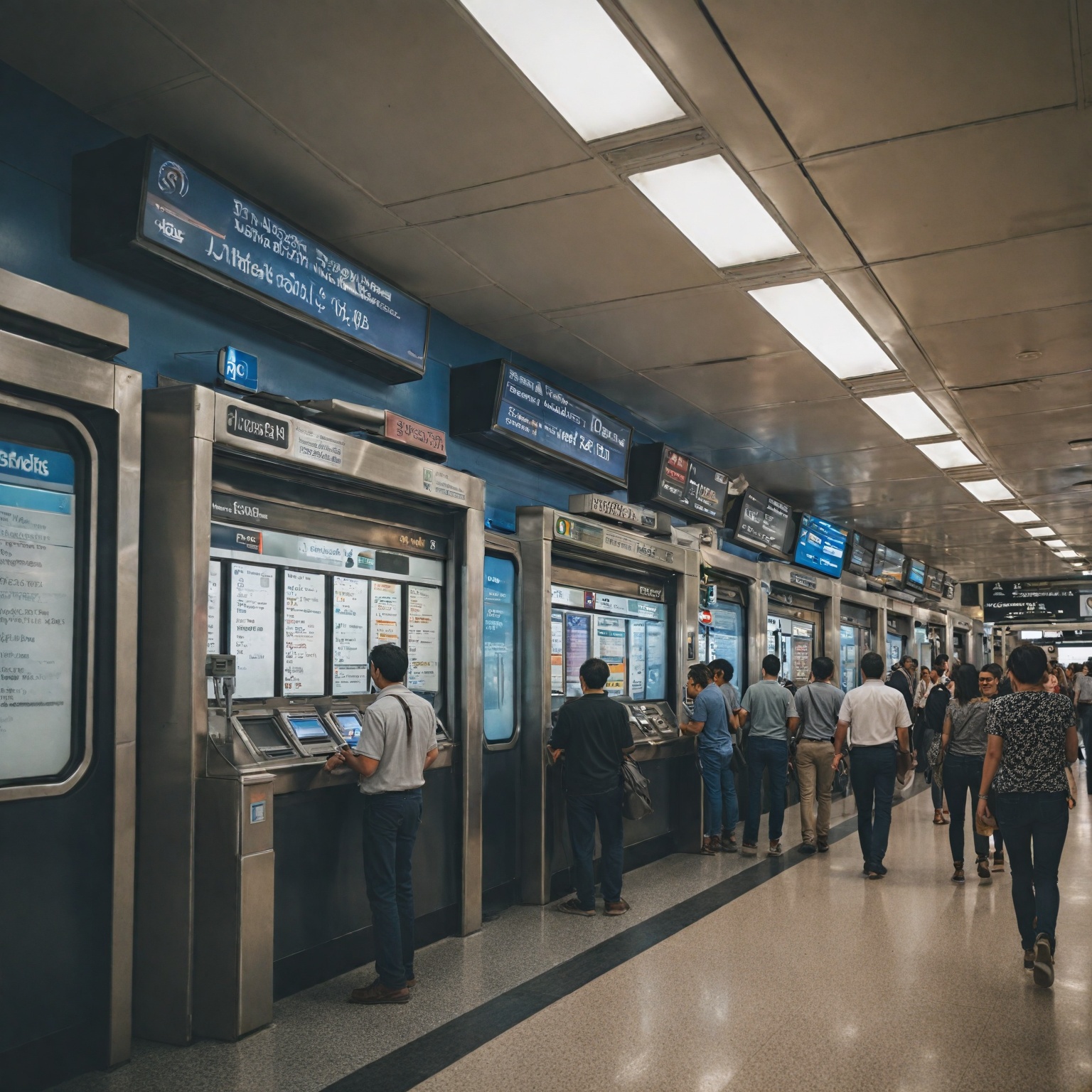Summary
Unlocking Indian Railways Ticketing Secrets: Enhanced Emergency Quota Rules for Same-Day Requests explores recent reforms in the Indian Railways ticketing system, focusing primarily on changes to the Emergency Quota (EQ) rules. The Emergency Quota is a discretionary reservation facility designed to accommodate urgent travel needs of high-ranking officials such as ministers, judges, members of parliament, and senior bureaucrats. Historically, this quota allowed same-day ticket requests even when general quotas were fully booked, serving as a crucial mechanism for last-minute official travel.
Recent policy updates have significantly tightened the rules around Emergency Quota bookings, particularly eliminating acceptance of same-day EQ requests. Reservation charts are now finalized eight hours before train departure, doubling the previous four-hour window, and all EQ requests must be submitted by specified cutoff times on the day prior to travel. For example, requests for trains departing before 2:00 pm must reach the EQ cell by noon the previous day, and for later departures, by 4:00 pm the previous day. These measures aim to improve transparency, reduce misuse, and streamline chart preparation to prevent train delays, marking a major shift in Indian Railways’ operational protocols.
The reforms have prompted mixed responses. On one hand, passengers and railway officials have reported improvements in punctuality and fairness, with forwarding authorities mandated to verify authenticity of requests and maintain detailed registers to ensure accountability. On the other hand, some express concerns over the reduced flexibility for genuine emergencies arising on the day of travel, highlighting a trade-off between operational efficiency and last-minute travel needs. These changes are part of a broader modernization effort by Indian Railways, which also includes enhanced ticketing infrastructure capable of handling large volumes of bookings, multilingual interfaces, and revised advance booking windows aimed at benefiting the general traveling public.
This topic is notable for illustrating how a vast and complex reservation system balances competing demands of efficiency, transparency, and accommodation of urgent official travel. The enhanced Emergency Quota rules reflect Indian Railways’ attempts to curb misuse, optimize seat allocation, and improve overall passenger experience amid evolving operational challenges and technological upgrades.
Background
Indian Railways has long implemented various quota systems, including the Emergency Quota, VIP allotment, and bulk booking facilities, to manage passenger reservations effectively and accommodate different categories of travelers. The Emergency Quota specifically caters to urgent travel needs of High Official Requisition (HOR) holders such as ministers, judges of the Supreme Court and High Courts, Members of Parliament, and other individuals with emergent travel demands. These quotas are allotted strictly based on inter-se seniority and warrant of precedence, ensuring that critical official travel requirements are met promptly. After allotting the emergency quota for self-travel of HOR holders, other requests are considered, and remaining seats are released depending on factors such as urgency, government duty, sickness, bereavement, or job interviews.
Recent reforms in Indian Railways’ ticketing system aim to improve passenger convenience and increase transparency. The reservation chart preparation time was revised to eight hours before departure, with charts finalized at 9:00 pm the previous evening for trains leaving before 2:00 pm. This measure helps provide better clarity to passengers and prevents delays in train departures caused by late chart preparation. Additionally, the ticketing system upgrade is designed to handle a much larger volume of bookings and inquiries, with capabilities to process 150,000 ticket bookings and 4 million enquiry requests per minute. The new system also includes features such as multilingual interfaces, seat preferences, fare calendars, and dedicated booking options for Divyangjan, students, and patients. Moreover, Indian Railways is considering reducing or eliminating clerkage charges on refunds for cancelled or unconfirmed waitlisted tickets to further benefit travelers.
Another significant change involves restricting advance booking to a 60-day window, a reduction from the earlier 120 days. This step is intended to make more tickets available to genuine travelers with confirmed plans while ensuring fairness in ticket availability. Passengers who purchased tickets beyond the 60-day period before this rule change are not affected by this revision. Together, these reforms reflect Indian Railways’ efforts to modernize its ticketing infrastructure, enhance service quality, and optimize quota allocations for diverse passenger needs.
Emergency Quota System
The Emergency Quota, also known as the HO Quota, is a discretionary allotment system implemented by Indian Railways primarily to provide berth reservations in urgent or emergency situations. This quota is intended for high-ranking officials such as railway authorities, ministers, members of parliament (MPs), members of legislative assemblies (MLAs), judges, and other dignitaries who require immediate travel accommodations. The seats allocated under this quota are minimal and are periodically reviewed based on actual necessity to ensure optimal utilization.
The Emergency Quota can be utilized even when general tickets have been booked and are currently on the waiting list, allowing eligible travelers to secure seats during critical times. Eligibility is contingent on proving the urgency of the travel requirement, making the quota an essential mechanism for accommodating unforeseen and time-sensitive journeys.
In recent reforms, the Ministry of Railways has issued circulars modifying the rules governing the Emergency Quota, particularly emphasizing same-day requests to streamline the booking process. These changes aim to enhance transparency and efficiency, preventing misuse while ensuring that legitimate emergency travel needs are met promptly. The ministry has also mandated forwarding authorities to verify the authenticity of all Emergency Quota requests in adherence to established guidelines. This oversight helps maintain the integrity of the system and reduces potential delays in chart preparation and train departures.
The Emergency Quota forms part of broader ticketing reforms by Indian Railways, which include adjustments to chart preparation times and booking windows to improve overall passenger convenience.
Enhanced Emergency Quota Rules for Same-Day Ticket Requests
In a significant policy update, the Ministry of Railways has revised the rules governing the submission of Emergency Quota (EQ) ticket requests, particularly impacting same-day travel bookings. Following the decision to finalise reservation charts eight hours prior to train departures—an increase from the previous four-hour window—requests for EQ accommodations must now be submitted at least one day before the scheduled journey.
Specifically, for trains departing between 00:00 hours and 14:00 hours, EQ requests are required to reach the EQ cell by 12:00 PM on the previous day. For trains scheduled to depart between 14:01 hours and 23:59 hours, requests must be submitted by 4:00 PM the preceding day. This revision effectively eliminates the acceptance of same-day emergency quota requests, aiming to streamline the reservation process and prevent last-minute chart delays that could inconvenience passengers or delay train departures.
Additional stipulations apply for Sundays and public holidays. Requests for trains departing on a Sunday, or on holidays immediately following a Sunday, must be submitted during office hours on the last working day before the holiday. This measure is designed to accommodate the unique challenges posed by non-working days while ensuring timely processing of EQ allotments.
The Railway Board’s reservation cell, which handles a high volume of EQ requests from VIPs, railway officials, senior bureaucrats, and various government departments, has been directed to allocate the quota judiciously and with prudence to maintain fairness in allotment. Moreover, forwarding authorities are tasked with verifying the authenticity of each request and ensuring strict compliance with existing EQ guidelines to prevent misuse of the system.
To maintain transparency and accountability, each officer, section, or federation is required to maintain a register documenting all EQ requests. This register must diarise the journey details, source of the request, and include the diary number on the requisition forms. The responsibility for verifying the credentials of the traveling party lies with the forwarding or signing authority.
These enhanced EQ rules form part of broader reforms aimed at improving the efficiency, fairness, and clarity of Indian Railways’ ticketing system, benefiting passengers and administrative processes alike.
Impact of the Enhanced Emergency Quota Rules
The introduction of enhanced rules for the Emergency Quota (EQ) in Indian Railways has brought significant changes to ticketing processes and passenger experience. A key modification is the discontinuation of same-day travel requests under the Emergency Quota, following the decision to finalize reservation charts eight hours prior to train departure, replacing the earlier four-hour window. This change aims to prevent last-minute misuse of the quota and ensure timely preparation of reservation charts, thereby avoiding delays in train departures and inconveniences to passengers.
The Emergency Quota primarily serves high-ranking officials such as Members of Parliament, Supreme Court and High Court judges, and senior bureaucrats, who receive berth allotments strictly based on their inter-se seniority. Requests beyond these designated holders are considered subsequently, with priority given based on urgency criteria like government duty, sickness, bereavement, or job interviews. By enforcing stricter deadlines and requiring written requests signed by Gazetted Officers—including contact details of both the signatory and passengers—the Indian Railways aims to enhance accountability and reduce fraudulent or unnecessary use of the quota.
Operationally, these reforms encourage a more judicious allocation of reserved berths and seats, balancing the needs of VIPs and dignitaries with the general traveling public. The streamlined process and early chart finalization are expected to reduce pressure on reservation counters, promote online ticketing, and diminish the role of touts, leading to cost savings for Indian Railways. Moreover, by prioritizing timely chart preparation, the rules contribute to smoother train operations and improved punctuality, addressing longstanding concerns about travel disruptions caused by delayed seat allocations.
Passenger Awareness and Communication Efforts
To ensure effective utilization of the emergency quota and related facilities, Indian Railways has undertaken multiple initiatives aimed at enhancing passenger awareness and communication. These efforts include clear guidelines and instructions for both passengers and forwarding authorities to maintain transparency and authenticity in the allotment process. Specifically, forwarding authorities are requested to verify the genuineness of individuals applying under the emergency quota and ensure strict adherence to the existing guidelines, thereby preventing misuse of the facility.
Furthermore, the Ministry of Railways has issued official circulars to communicate changes in the emergency quota rules, emphasizing judicious allocation amidst a high volume of requests from VIPs, officials, and government departments. These circulars serve to keep all stakeholders informed about the policy updates and reinforce the importance of prudent allotment.
In addition to emergency quota information, Indian Railways promotes alternative booking options to streamline passenger experiences. Bulk booking facilities are available for large groups such as families, educational institutes, and marriage parties, which can be accessed at ticket booking centers to facilitate smoother reservations. The railways also encourage passengers to shift towards online booking platforms, offering e-ticket services with doorstep delivery options through cash on delivery payments. This move aims to reduce congestion at reservation counters, lower operational costs, and combat ticket touting effectively.
Complementing these official channels, online communities like r/IndianRailways play a supportive role by providing a platform for railfans and passengers to share news, updates, and experiences related to the Indian railway system. These forums help disseminate important information and foster an informed passenger base while maintaining respectful discourse.
Comparative Analysis with Other Quota Systems
The Emergency Quota (HO Quota) in Indian Railways operates as a discretionary allotment primarily intended for high-ranking officials such as Members of Parliament, ministers, judges, and other dignitaries during urgent travel situations. This quota is unique in that it can be utilized even when general quota tickets are fully booked or in waiting status, offering a minimal but critical number of seats that are periodically reviewed based on actual demand. Its allocation is governed strictly by seniority among eligible holders and the nature of the emergency, such as government duty, medical emergencies, bereavement, or job interviews.
In contrast, other quota systems like Tatkal and Senior Citizen quotas serve different purposes and operate under distinct guidelines. The Tatkal quota allows passengers to book tickets one day prior to travel, providing last-minute reservation opportunities for the general public. However, it is not designed to cater to immediate emergency travel since bookings open only a day before departure and are subject to user verification and identification checks introduced recently to curb misuse. Additionally, Tatkal bookings are available only during a specified time frame and require advanced preparation, unlike the Emergency Quota which opens shortly before chart preparation and remains active for a limited window to address genuine urgent needs.
Other quotas, such as the Senior Citizen quota, prioritize specific demographic groups by reserving lower berths or seats, ensuring comfort and convenience but do not accommodate emergency situations per se. Similarly, Ladies and General quotas cater to broader categories without discretionary allotment powers that Emergency Quota possesses.
The Emergency Quota’s operational flexibility—such as the release of reserved seats just hours before train departure and allowance for same-day requests under exceptional circumstances—distinguishes it from the more rigidly scheduled and category-specific quotas. Furthermore, Indian Railways’ recent reforms, including earlier chart finalization times and enhanced user verification for Tatkal bookings, emphasize a more structured reservation process for general quotas while preserving the Emergency Quota’s role in urgent travel scenarios.
Case Studies and Passenger Experiences
Several passengers have shared their experiences highlighting the impact of the revised Emergency Quota (EQ) rules implemented by Indian Railways. Previously, last-minute requests for EQ tickets were common, especially among VIPs and government officials. However, with the new mandate requiring requests to be submitted at least a day before travel, many passengers have noted a significant improvement in the punctuality of chart preparation and train departures.
One common scenario involves groups traveling for special occasions such as marriages, educational trips, or family gatherings, who often use bulk booking facilities alongside EQ to secure seats. These passengers appreciate the clarity brought about by the updated guidelines, which reduce uncertainties associated with same-day bookings and cancellations. For example, educational institutions coordinating large groups report smoother planning due to the clear cutoff times and the requirement to verify the genuineness of requests.
Several travelers also remarked on the enhanced fairness and transparency resulting from the ministry’s directive to forwarding authorities to strictly verify requests and ensure compliance with existing guidelines. This has helped curb misuse of the emergency quota by non-eligible persons, fostering a more equitable distribution of tickets among genuine travelers.
However, some passengers have expressed concerns about the reduced flexibility, particularly in emergency situations arising on the day of travel, as same-day EQ requests are no longer entertained. While this has improved operational efficiency, it has also necessitated more proactive planning by travelers and forwarding authorities alike.
Future Developments and Recommendations
Indian Railways is actively working to further enhance its ticketing system to improve passenger convenience and operational efficiency. The upgraded system aims to process up to 150,000 ticket bookings per minute, which is five times the current capacity, and handle 4 million enquiry requests per minute. This will include a multilingual interface, options for seat preferences, fare calendars, and specialized booking features for Divyangjan, students, and patients. Such technological advancements are expected to streamline ticket booking and reduce last-minute cancellations and no-shows.
In addition to system upgrades, Indian Railways is considering reforms related to financial aspects of ticketing, such as reducing or eliminating “clerkage” charges deducted from refunds on cancelled or unconfirmed waitlisted tickets. This move could increase transparency and customer satisfaction.
Regarding quota allocations, the ministry continues to emphasize strict compliance with guidelines for emergency quota allotments to ensure fairness and prevent misuse, especially given the large volume of requests from VIPs, officials, and government departments. The forwarding authorities are instructed to verify the authenticity of each request diligently.
There is also a push to optimize the Advance Reservation Period (ARP). Having revised the ARP multiple times since 1981, the latest change reduced the booking window from 120 to 60 days to better manage cancellations and improve ticket availability for genuine travelers. Continuous monitoring and adjustments of ARP are recommended to balance early travel planning and seat availability.
Furthermore, the subdivision of train seats into various quotas—such as lower berths for senior citizens, reserved seats for military personnel, members of parliament, and emergency quotas—will continue to be refined to accommodate diverse passenger needs while minimizing delays in chart preparation and train departures.
The content is provided by Sierra Knightley, Fact-Nest













